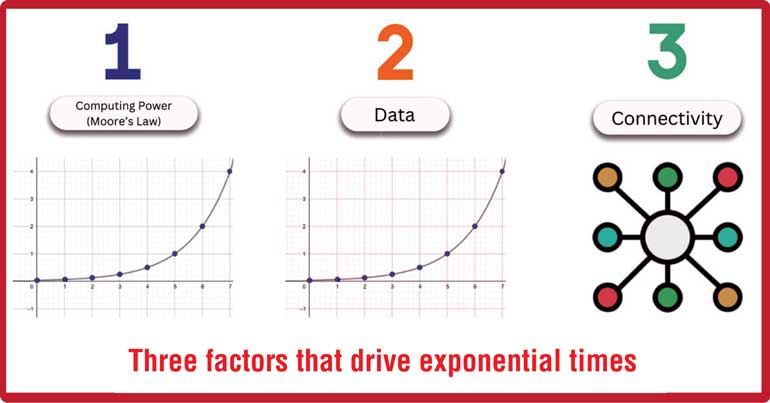Wednesday Feb 18, 2026
Wednesday Feb 18, 2026
Thursday, 25 April 2024 00:24 - - {{hitsCtrl.values.hits}}

 A golden rule for leaders embarking on digital transformation is to educate themselves. This education is not merely academic; it is a necessary step in becoming conversant in the language of technology, a prerequisite for the formulation and execution of effective digital strategies – adapted from Rewired, McKinsey, 2021.
A golden rule for leaders embarking on digital transformation is to educate themselves. This education is not merely academic; it is a necessary step in becoming conversant in the language of technology, a prerequisite for the formulation and execution of effective digital strategies – adapted from Rewired, McKinsey, 2021.
We have never seen change like we experience today. In today›s VUCA (Volatile, Uncertain, Complex, and Ambiguous) world, corporate leaders find themselves rowing not in the calm waters but in the turbulent rapids of white-water rafting. The calm predictability of the past has given way to a landscape where constant change is the only constant.
Amidst this turbulence, one of the most significant drivers of change has been technology, whose capabilities are expanding at a staggering rate. There are three factors that create these ‘disruptive’ trends, which need to be understood in the right magnitude and scale.
1. The first, as speculated by Moore›s Law, which asserts that computing power doubles approximately every 18 months – this brings unimaginable power - what was not possible one year or six months ago, is possible today. Computing power is moving from processing to learning (and AI and ML), and this ‘staggering computing power’ is something many leaders haven’t come to terms with, as they perceive ‘computers’ as data processing machines.
2.The second, is the availability of data and megabits of data that is generated from every transaction. Data is our new friend – but how well do we use our new friend or are we still in the era of collecting data rather than using it?
3. Third is connectivity – everything in our lives is connected today. We have a variety of connections: human to human, human to machine and machine to machine – these connections on a global scale provide a different world of possibilities.
The synthesis of these three factors generates an exponential environment – making it quite challenging for the incremental human mind to comprehend. The repercussions of this exponential growth are diverse. This new era, dubbed ‹exponential times›, is punctuated by disruption. Many leaders, however, fail to recognize and connect the magnitude of impact these three technological drivers can have on their business, often realizing the consequences when it›s too late. This is often true for companies that are successful as their success blinds them (nothing can bring us down!) from seeing possible disruption in the right scale and magnitude. Traditional, history lead (future is more of the past mentality), long-range planning often overlooks the need to reassess the fundamental assumptions of a business model, permitting companies to operate under strategies that may soon be obsolete.
Yet, for those who look differently, these exponential times offer a treasure trove of opportunities ripe for the taking, both within traditional domains and in adjacent markets. As old business models wane in relevance, becoming susceptible to disruption, the need to innovate becomes paramount. More often than not, the solutions to reinventing these models are embedded in digital and technology. Unfortunately, many business leaders, while experts in the intricacies of their industries, lack the technological insight to identify and leverage these digital solutions to address their business challenges.
Having said that, if we ask CEOs, many will tell you that their companies are adopting digital solutions at large scale, they may even tell that they are on a digital transformation journey! Well and good. However, these initiatives are often driven by IT departments rather than stemming from a strategic business perspective, leading to a fundamental misunderstanding between ‘technology transformations’ rather than a true ‘digital transformation’.
Harvard Research (September 2022) suggests that a staggering 87.5% of digital transformation initiatives fail to yield the expected results. During these periods of disruptive change, people—including leaders—become the biggest challenge, either actively supporting or protesting, or even passively resisting change. This resistance often stems from a misunderstanding of digital transformation, which is commonly misconceived as solely a technological endeavor. In truth, digital transformation is not about technology per se but rather about aligning digital capabilities with business problems, underpinned by a strategic approach that encompasses leadership and change management to navigate challenges and overcome obstacles.
Senior leaders often regard digital transformation with apprehension, stemming from a lack of digital literacy. This deficiency prevents them from asking the right questions and understanding the potential of digital solutions until it is too late, as their businesses are facing disruption. Addressing this gap in knowledge is not about becoming experts in technology but about gaining the fluency to engage meaningfully with technological concepts and possibilities.
McKinsey›s recent book ‹Rewired› reinforces this notion. As Eric Lamarre, one of the authors and a senior partner at McKinsey asserts, ‘a golden rule for leaders embarking on digital transformation is to educate themselves. This education is not merely academic; it is a necessary step in becoming conversant in the language of technology, a prerequisite for the formulation and execution of effective digital strategies’.
For CEOs and top management, the lesson is clear: to navigate and lead through these exponential times successfully, they must invest in understanding the digital landscape. This understanding will enable them to identify and harness opportunities, anticipate, and mitigate risks, and drive innovation that is coherent with the evolving digital paradigm.
In conclusion, the imperative for today›s CEOs is not just to lead with acumen in their respective industries but to become digitally fluent—to speak the language of technology as second nature. Only then can they truly steer their organizations through the treacherous but opportunity-laden waters of the digital era. The commitment to ‘life-long learning’ (one of the top ten skills in the world today) and adaptability will distinguish successful leaders as they chart courses through these uncharted waters of digital transformation.
(The author is a specialist in organisational transformation and change. He helps C-level leaders to embrace change and support transformation at personal, team and organisational levels. He is an INSEAD Alumni with a Master’s in Coaching and Consulting for Change (MCCC) and a Doctoral candidate at ESC Clermont Business School, France. He holds an MBA, a Diploma in Marketing (UK) and is a Fellow of CIM (UK).)